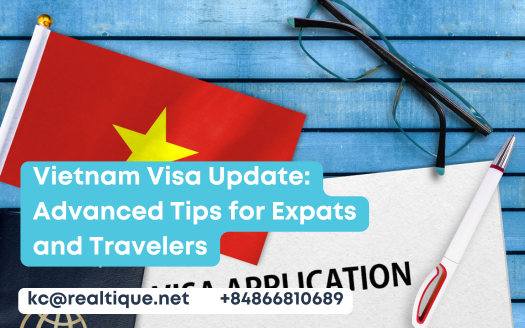Vietnam Visa Update: Advanced Tips for Expats and Travelers
Navigating Vietnam’s visa process can feel complex, especially with the variety of options available for foreigners. Whether you’re planning to visit, retire, or start a business in Vietnam, having the right visa is essential. In this article, we break down the latest Vietnam visa updates, with insights from visa and business specialist Hannah. From e-Visas to investment visas, here’s everything you need to know.
Table of Contents
1. Understanding the e-Visa
The e-Visa remains one of the most popular visa options for tourists and business travelers in Vietnam.
Cost and Processing Time:
The e-Visa fee is $25, and it typically takes 3 working days to process. This visa allows a single entry and a stay of up to 90 days.Extending an e-Visa:
If your e-Visa is about to expire, you can apply for an extension while in Vietnam. Extensions are handled through immigration offices or authorized agents and cost between $100 and $150. Processing time ranges from 7 to 10 working days.Eligibility:
Not all nationalities are eligible for the e-Visa. Some countries, such as Nigeria and Afghanistan, are excluded due to bilateral agreements or security concern. Always check Vietnam’s official visa website for updated information.
2. Does Property Ownership Grant a Visa?
One common question is whether buying property in Vietnam grants a long-term visa. Unfortunately, owning property does not automatically qualify you for a visa. Vietnam has yet to introduce a specific visa program for property owners, unlike some other countries.
3. Visa Options for Retirees
Vietnam does not currently offer a retirement visa. However, retirees often use business visas or multiple-entry tourist visas to stay long term. These visas can be renewed periodically, offering a viable solution for those wanting to settle in Vietnam.
4. Exploring the Investment Visa
If you’re planning to start a business or invest in Vietnam, the investment visa is an excellent option.
Eligibility Criteria:
- The amount of capital invested determines the visa type and duration.
- Certain industries may require additional approvals.
- Your nationality can also influence the process slightly.
Timeline and Costs:
Setting up a company in Vietnam usually takes 1 to 2 months and costs between $2,000 and $5,000, depending on the business structure.
5. Key Visa Types at a Glance
Here’s a quick recap of the most common visa types for foreigners in Vietnam:
- e-Visa: Single-entry for up to 90 days.
- Marriage Visa: For those married to a Vietnamese citizen.
- Work Visa: Issued with a job offer from a Vietnamese company.
- Investment Visa/Business Visa: For starting or investing in a business. A versatile option for long-term stays.
6. Company Setup for Long-Term Visas
Starting a company in Vietnam not only secures an investment visa but also opens doors to long-term opportunities.
- Preparation Steps:
- Understand your target industry and its requirements.
- Plan your capital investment strategically.
- Work with a professional to navigate legalities and approvals.
Consulting with a business specialist can simplify this process and ensure compliance with local regulations.
7. Tips for a Smooth Visa Process
- Always check the latest visa regulations, as they can change frequently.
- Ensure all documents are accurate and up to date before submission.
- Seek advice from professionals for complex processes like business visas and company setup.
Whether you’re visiting, investing, or settling in Vietnam, understanding the visa process is essential for a seamless experience. From the straightforward e-Visa to the more detailed investment visa, each option has its unique requirements and benefits.
At Realtique, we’re here to guide you through every step of the process. For more detailed insights and tips, watch our latest YouTube video featuring advanced Vietnam visa updates.
Don’t forget to like, comment, and subscribe to our channel for weekly updates on Vietnam visas, real estate, and business opportunities.





